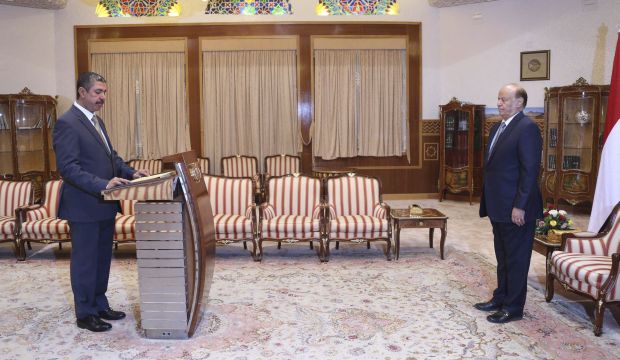
Yemen's newly appointed Prime Minister Khaled Bahah (L) swears in before the country's President Abd Rabbuh Mansur Hadi at the Presidential Palace in Sana'a, on November 9, 2014. (Reuters/Yemen's Defense Ministry/Handout via Reuters)
Sana’a, Asharq Al-Awsat—The new Yemeni government headed by Prime Minister Khaled Bahah was sworn in on Sunday at the Presidential Palace in Sana’a in front of Yemeni President Abd Rabbuh Mansur Hadi.
Faris Al-Saqaf, an adviser to President Hadi, told Asharq Al-Awsat the new government’s “being sworn in in front of the president and such a large number of ministers” represented a major step for the country, and that it had “successfully passed a difficult obstacle and the challenges that were placed in its path.”
In a statement following the swearing-in ceremony, Bahah said talks were now underway “between different sides to return security to the country,” which has seen a marked absence of military and police presence on the streets since September and the takeover of the capital and other parts of the country by the Shi’ite Houthi movement.
Bahah said the new government was awaiting all the different political factions in Yemen to pledge to work beside President Hadi and the government, and to abide by all the agreements relating to the political transitional period following the resignation of former President Ali Abdullah Saleh in 2012—“starting from the Gulf Initiative, and ending with the authorization of the president, the prime minister, and the signing of the Peace and Cooperation agreement [signed between Hadi and the Houthis on September 21], as well as the decisions taken by the UN Security Council relating to the outcomes of the National Dialogue Conference.”
He added the new government was keen to hold talks with the General People’s Congress, the party headed by Saleh and which currently holds a majority in the Yemeni parliament.
One of the ministers in the new government—who spoke on condition of anonymity because he was not authorized to brief the media—told Asharq Al-Awsat that Saleh, his party and the Houthis had “failed in their attempts to foil the formation of the new government and its taking the oath of office.”
He said he believed this was largely due to “their fears over being sanctioned” in accordance with UN Security Council Resolution 2140, which slapped travel bans and asset freezes on Saleh and two senior Houthi members due to what the Security Council deemed their undermining the country’s political transition process, as outlined in the Gulf Initiative.
Many have blamed Saleh for the deterioration in the security situation in the country, alleging that he and former members of his regime in the military and security apparatus had aided the Houthi advance across the country.
The General People’s Congress has officially refused to participate in the new government, despite some of its members being included. In a statement on Saturday, the party called on all of its members in the government to withdraw from their posts, though this did not occur.
The Houthi movement has also officially rejected the formation of the new government, also despite having members in the newly sworn-in cabinet. In a statement released before the swearing-in ceremony, the group said the formation of the government “contravened the Peace and Cooperation agreement” signed between the group and the president, and stressed “the necessity of re-forming the makeup of the government,” which it accused of being politically biased and of “obstructing the political transition process in Yemen.”
Informed Yemeni sources, speaking to Asharq Al-Awsat on condition of anonymity, said the Houthis, their affiliate Ansar Allah, and the General People’s Congress would, in response to the formation of the new government, publicly announce a political agreement between them, which they said has been ongoing in secret since Saleh’s resignation in 2012.
The sources said the agreement would task Ansar Allah and members of the military and security apparatus loyal to Hadi with strengthening the Houthis’ grip on Sana’a, Amran and other areas of the country under their control.

Trackbacks/Pingbacks